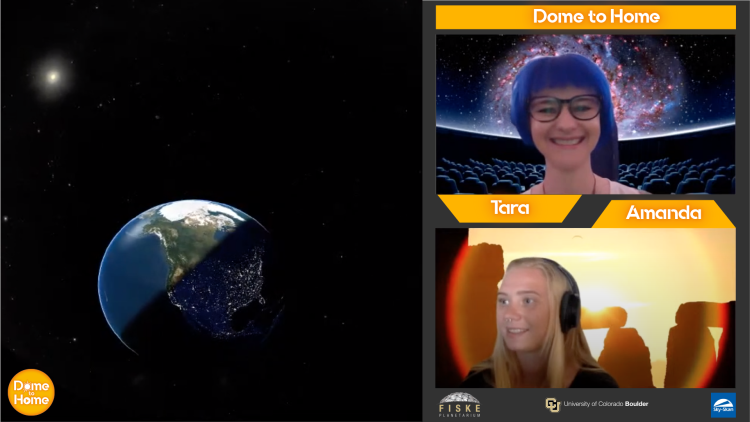Extending the Fiske Planetarium experience beyond Boulder in a remote setting with "Dome to Home"

In a live online session to replace either the K-12 field trip or CU class visit, Fiske offered both a navigator for the virtual universe, which would be shared on the screen, and a presenter to respond to questions from students and instructors in a chat. The sessions are broadcast live on YouTube and recorded to broaden the audience served. K-12 teachers also could coordinate with the presenters to pre-load questions for the sessions, helping them actively participate with their students during the session instead of just listening. Any CU faculty who wants to use the software can teach the class as the presenter in cooperation with the navigator.
The sessions have been particularly engaging when 30-60 students attend synchronously, and asynchronous participation through YouTube has reached 200-800 individual hits, with the most popular video being a tour of the solar system. From March to May, when Fiske would have typically hosted over 5000 students on K-12 field trips in person, they were able to offer 500-800 students a virtual planetarium experience. Both CU Faculty and K-12 teachers reported that students were more engaged on planetarium days during remote teaching, and they really appreciated working with the navigator to include the students in active learning processes.
This new system of hosting virtual sessions with students had some drawbacks. "Experiencing the Universe on a flat screen monitor is by definition less immersive that being fully surrounded by our digital dome theater," said John Keller, Director of the Fiske Planetarium. "However, we were pleased with student responsiveness and willingness to engage remotely given current COVID challenges and constraints." Nevertheless, there was one significant gain: in the past, rural schools would request field trips, but were often not able to attend due to the cost or time of travel. Now, they could visit the Dome from their communities. "One of the upsides of shifting into this virtual space is that we’ve realized that we can offer live, interactive programs to rural areas in Colorado that we normally might not be able to reach," said Briana Ingerman, Education Programs Manager at the Planetarium. "We’re really looking forward to being able to work with broader communities in this way even after we’ve returned to Fiske."
Please contact the Fiske staff if you are interested in hosting a virtual planetarium session for one of your classes in the fall semester. You will need a teaching assistant to moderate the questions in the chat window. The planetarium theater will be open for class visits as well.

